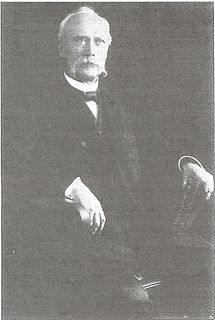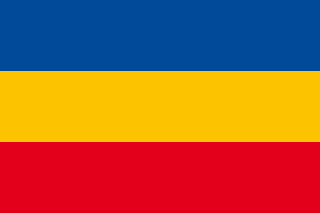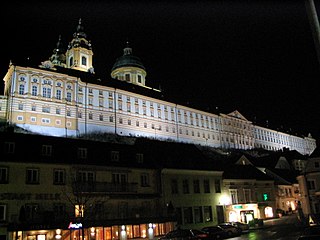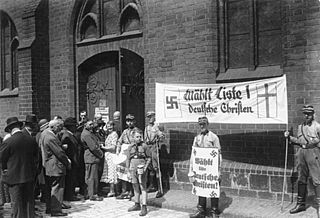
Mecklenburg-Vorpommern also known by its anglicized name Mecklenburg-West Pomerania, is a state of Germany. Of the country's 16 states, Mecklenburg-Vorpommern ranks 14th in population, 6th in area, and 16th in population density. Schwerin is the state capital and Rostock is the largest city. Other major cities include Neubrandenburg, Stralsund, Greifswald, Wismar and Güstrow.

Ludwigslust is a central castle town of Mecklenburg-Vorpommern, Germany, 40 km south of Schwerin. Since 2011 it is part of the Ludwigslust-Parchim district.

The Evangelical Church in Germany is a federation of twenty Lutheran, Reformed (Calvinist) and United Protestant regional churches and denominations in Germany, which collectively encompasses the vast majority of Protestants in that country. In 2017, the EKD had a membership of 21,536,000 members, or 26.1% of the German population. It constitutes one of the largest national Protestant bodies in the world. Church offices managing the federation are located in Hannover-Herrenhausen, Lower Saxony. Many of its members consider themselves Lutherans.

The Pomeranian Evangelical Church was a Protestant regional church in the German state of Mecklenburg-Vorpommern, serving the citizens living in Hither Pomerania. The Pomeranian Evangelical Church was based on the teachings brought forward by Martin Luther and other Reformators during the Reformation. It combined Lutheran and Reformed traditions. The seat of the church was Greifswald, the bishop's preaching venue was the former Collegiate Church of St. Nicholas, Greifswald.
Georg Christian Benedict Ackermann was a German theologian and teacher.

Neo-Lutheranism was a 19th-century revival movement within Lutheranism which began with the Pietist driven Erweckung, or Awakening, and developed in reaction against theological rationalism and pietism. This movement followed the Old Lutheran movement and focused on a reassertion of the identity of Lutherans as a distinct group within the broader community of Christians, with a renewed focus on the Lutheran Confessions as a key source of Lutheran doctrine. Associated with these changes was a renewed focus on traditional doctrine and liturgy, which paralleled the growth of Anglo-Catholicism in England. It was sometimes even called "German Puseyism". In the Roman Catholic Church in Germany, neo-Lutheranism was paralleled by Johann Adam Möhler. The chief literary organ of the neo-Lutheranism was Evangelische Kirchenzeitung, edited by Ernst Wilhelm Hengstenberg.

The Prussian Union of Churches was a major Protestant church body which emerged in 1817 from a series of decrees by Frederick William III of Prussia that united both Lutheran and Reformed denominations in Prussia. Although not the first of its kind, the Prussian Union was the first to occur in a major German state.

Liturgical music originated as a part of religious ceremony, and includes a number of traditions, both ancient and modern. Liturgical music is well known as a part of Catholic Mass, the Anglican Holy Communion service and Evensong, the Lutheran Divine Service, the Orthodox liturgy and other Christian services including the Divine Office. Such ceremonial music in the Judeo-Christian tradition can be traced back to both the Temple in Jerusalem and synagogue worship of the Hebrews.

The Divine Service is a title given to the Eucharistic liturgy as used in the various Lutheran churches. It has its roots in the pre-Tridentine Mass as revised by Martin Luther in his Formula missae of 1523 and his Deutsche Messe of 1526. It was further developed through the Kirchenordnungen of the sixteenth and seventeenth centuries that followed in Luther's tradition.
The Evangelical Church Berlin-Brandenburg-Silesian Upper Lusatia is a United Protestant church body in the German states of Brandenburg, Berlin and a part of Saxony.

The name Agenda is given, particularly in the Lutheran Church, to the official books dealing with the forms and ceremonies of divine service.

Jördenstorf is a municipality in the Rostock district, in Mecklenburg-Vorpommern, Germany.

The Schelf Church of St. Nicholas is an Evangelical Lutheran church dedicated to Saint Nicholas in the Schelfstadt quarter of Schwerin in Germany. The church is owned and used by a congregation within the Evangelical Lutheran Church in Northern Germany. It was originally built in 1238, but was rebuilt in 1713 in the Baroque style after destruction by a storm. It is the family burial place of the House of Mecklenburg-Schwerin, including Sophia Louise of Mecklenburg-Schwerin.

Johann Konrad Wilhelm Löhe was a pastor of the Lutheran Church, Neo-Lutheran writer, and is often regarded as being a founder of the deaconess movement in Lutheranism and a founding sponsor of the Lutheran Church–Missouri Synod (LCMS). From the small town of Neuendettelsau, he sent pastors to North America, Australia, New Guinea, Brazil, and the Ukraine. His work for a clear confessional basis within the Bavarian church sometimes led to conflict with the ecclesiastical bureaucracy. His chief concern was that a parish find its life in the eucharist, and from that source evangelism and social ministries would flow. Many Lutheran congregations in Michigan, Ohio, and Iowa were either founded or influenced by missionaries sent by Löhe. He is commemorated on 2 January by the calendars of both the LCMS and the Evangelical Lutheran Church in America.

The Abbey of the Holy Cross in Rostock, Germany, was founded in the 13th century by Cistercian nuns. It is the only fully preserved abbey in the city. The complex includes the former abbey church which is used today as the University Church (Universitätskirche). The remaining former convent buildings house the Museum of Cultural History for the city of Rostock.
The German Evangelical Church Confederation was a formal federation of 28 regional Protestant churches (Landeskirchen) of Lutheran, Reformed or United Protestant administration or confession. It existed during the Weimar Republic from 1922 until being replaced by the German Evangelical Church in 1933. It was a predecessor body to the Evangelical Church in Germany.

Gotthold Julius Rudolph Sohm was a German jurist and Church historian as well as a theologian. He published works concerning Roman and German law, Canon law and Church History.
The Evangelical Lutheran Church in Northern Germany is a member church of the Evangelical Church in Germany. It was established on 27 May 2012 as a merger of the North Elbian Evangelical Lutheran Church, the Evangelical Lutheran Church of Mecklenburg, and the Pomeranian Evangelical Church. It covers the combined area of all those former member churches, which are the federal states of Schleswig-Holstein, Hamburg and Mecklenburg-Vorpommern. Nordkirche is the only Landeskirche in Germany which covers parts of both New states of Germany and West Germany. It is also called Nordkirche. It has 2,027,751 members (31/12/2017). There are 1,704 ordained pastors and more than 84,000 volunteers working for Nordkirche (4/2016).
August Wilhelm Dieckhoff was a German Lutheran theologian known for his studies on the history of evangelical doctrine during the Reformation.




















